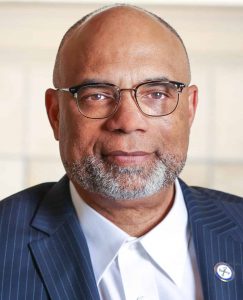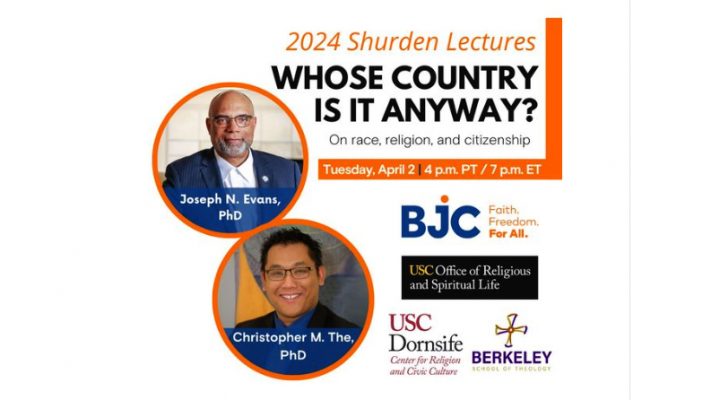The MAGA movement represents not only a yearning for a mythical golden age in American history but a strident campaign to transform the United States into a totalitarian nation, theologian Joseph Evans said.
“What you hear in ‘Make America Great Again’ is perhaps a euphemism for full-throated authoritarianism. But to make America great again is to usurp the democratic process,” Evans said during the 2024 Walter B. and Kay W. Shurden Lecture on Religious Liberty and Separation of Church and State. The annual event is sponsored by Baptist Joint Committee for Religious Liberty.

Joseph Evans
Evans serves as professor and chair of theology in the public square and director of the Center for Truth, Racial Healing and Restorative Justice at the Berkeley School of Theology in California. At one time he served as interim senior pastor at historic Friendship Baptist Church in Atlanta.
He was joined in the panel discussion by Christopher The, director of student research and initiative management for the Association of Theological Schools and a scholar whose research includes a focus on equipping immigrant churches for civic engagement.
The presentation titled “Whose Country Is It Anyway?” was moderated by Najuma Smith-Pollard, assistant director of community and public engagement with the University of Southern California Center for Religion and Civic Culture. The April 2 event was held at USC’s main campus in Los Angeles.
All three participants agreed that to ask “whose country is it, anyway?” is absurd because it implies there are some Americans who have a legitimate stake in the nation and some who don’t.
Yet it is the question insinuated by conservatives’ longing for pure racial and religious order, Evans said. “That is to say, as a matter of fact, ‘We are those who support that type of perspective. We have created God in our own image and likeness, and we are God.’”
“From the perspective of those who have enjoyed complete authority since the inception of this nation, the obvious answer is, ‘It is our nation.’”
Challenges to that political theology elicit greater determination to overthrow democracy, he warned. “Therefore, authoritarianism is now the only way that the old regime could possibly return to making America great again. So, the absurdity of the question is self-evident, but from the perspective of those who have enjoyed complete authority since the inception of this nation, the obvious answer is, ‘It is our nation.’”
But the entire premise of the MAGA movement is “absurd on face value” because it expresses a nostalgia for a racially, politically and religiously pure era in American history that never existed, Evans added. “For somebody to say, ‘make America great again,’ there are people in my tradition who would ask another question: When was it great when you do not include all people at the table? That would be a good definition for ‘great,’ that everyone is welcome at the table.”

Christopher The
The said the discussion was poignant for him as an American of Chinese and Indonesian descent raised in a California desert community that was not multicultural or multi-racial. To an extent, his answer to “whose country is it, anyway?” derived from the “The New Colossus,” the poem cast on the base of the Statue of Liberty: “Give me your tired, your poor, your huddled masses yearning to breathe free, the wretched refuse of your teeming shore.”
“It’s a woman who is shining a lamp. And it seems idealistic to point to that as a symbol, but it’s not something I want to let go of. It’s something that, as absurd as it seems, I don’t want to jettison,” he said.
“Let’s not strive for who can have a bigger slice of one pie but fundamentally rethink the pie itself.”
What if Americans actually valued the concept of sharing the nation with immigrants and others, rather than parceling it out exclusively to “the right kind of people,” The asked. “What would sharing this space look like? Let’s not strive for who can have a bigger slice of one pie but fundamentally rethink the pie itself.”
That will require dedication and struggle to protect democracy and racial and religious justice from white Christian nationalists, The said. “We have to wrestle with the reality that there are folks who will take advantage of a situation merely because it benefits them.”
Humility is another ingredient needed in the movement against MAGA, he added. “Humility leads to seeing others, recognizing others and then actually making commitments that interlock your fate with the other. It’s a communal type of struggle.”
Advocating for democracy can range from writing op-eds to standing up for those being actively oppressed, Evans said. “We are in that space now that we’re going to defend the rights of all people. We are literally on the edge of losing our democratic rights. And for Baptists, that’s good fighting stuff right there.”
Related articles:
The Christian case for democracy | Analysis by Mark Wingfield
Most Americans believe democracy is at risk in 2024 — but for different reasons
Things fall apart. Is democracy one of them? | Analysis by Erich Bridges


